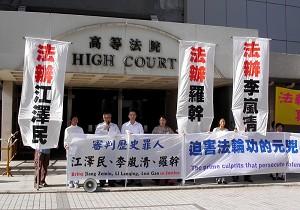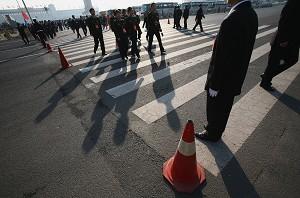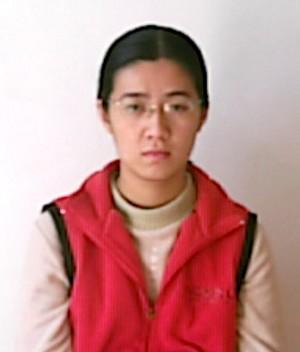In a historic decision, the Hong Kong High Court issued a writ to its counterpart in mainland China to serve out of jurisdiction three former high-ranking officials with papers suing them for the torture of Falun Gong adherents, the two plaintiffs announced at a press conference last week.
On the basis of mutual legal assistance agreements between the territory and the mainland, Hong Kong Judge Roy Yu approved service to former Chinese Communist Party Leader Jiang Zemin, as well as to Luo Gan, and Li Lanqing, both former members of the party’s top organ, the Politburo Standing Committee.
“Demanding that a Chinese court deliver legal documents to China’s leaders is unprecedented,” says Theresa Chu, Director of the Human Rights Law Foundation-Asia, who worked on the case. “In the atmosphere of impunity surrounding torture and the campaign against Falun Gong in China, this procedural move by a Hong Kong court is a big step forward.”
Two Hong Kong residents filed the complaint in June suing the three officials for torture, illegal imprisonment, and persecuting Falun Gong, a spiritual discipline brutally suppressed in China since 1999. The court’s writ to serve the papers on the officials in China was issued in August, but only given final endorsement last week after a delay in approving the documents’ translation into Chinese.
“The plaintiffs do have leave to serve … out of the jurisdiction on the 1st and 2nd Defendants, Jiang Zemin and Li Lanqing, at the Bureau for Retired Cadres of the CCP Central Committee…and on the 3rd Defendant Luo Gan, at Zhongnanhai, Beijing,” says the concurrent writ.
This Hong Kong lawsuit is one of dozens of lawsuits filed by Falun Gong torture victims against Chinese officials around the world.
The decision also comes after two other recent victories for plaintiffs: a default judgment against Minister of Commerce Bo Xilai in Australia and a decision by the Constitutional Court in Spain allowing a case against Jiang to proceed.
Seeking Justice
For Mr. Chu O Ming, one of the plaintiffs, the case was not his first attempt at suing Jiang, who experts say was the primary instigator of the campaign against Falun Gong.
An entrepreneur from China now residing in Hong Kong, Chu was arrested and imprisoned for five years for filing a lawsuit with the Supreme People’s Court against Jiang in 2000 when he was still head of state. While in custody, Chu says he was shocked with electric batons and tortured severely. After his release he returned to Hong Kong, where he survives on social security since his business was destroyed during his imprisonment.
“I sincerely hope that people around the world will pay attention to cases which have been filed against Jiang … and which have cost all of the plaintiffs a painfully high price,” he says.
“I also sincerely hope that the Hu Jintao-Wen Jiabao regime will bravely acknowledge the persecution of Falun Gong in China and bring to justice Jiang Zemin and all those responsible, ending the eight-year-long repression.”
The other plaintiff in the case is Ms. Fu Xueying. In 2003, Fu was arrested without charge and sentenced secretly to three years in Shenzhen Detention Center and the Women’s Prison of Guangdong Province for distributing VCDs exposing abuses against Falun Gong.
While imprisoned, Fu says she was beaten, tortured, and forced to attend brainwashing sessions. To this day she suffers from a skin disease and cannot sit for extended periods of time.
Among those abusing Fu during her detention were officials from the 610 Office, a supra-legal task force charged with implementing the policy of persecution against Falun Gong. The agency was created by Jiang and headed by the two other defendants Li Lanqing and Luo Gan.
Upholding ‘One Country, Two Systems’
Owing to an agreement that Hong Kong would be governed according to the principle of “One Country, Two Systems,” the practice of Falun Gong is legal in the territory. As such, adherents are entitled to engage in lawful activities, including taking action to seek redress, something clearly unavailable in the mainland.
Still, with the Communist Party yielding significant influence over the Hong Kong authorities, Falun Gong has increasingly become a test case for whether local residents’ enjoyment of civil rights will survive the handover to Chinese rule. Whether the judiciary can maintain its independence has been central to this debate and experts say cases such as this one are an important test.
“The grant of Leave to Serve Out of Jurisdiction by the High Court of Hong Kong … is of great significance, because this embodies the most basic principle in a real legal system,” says Terri Marsh, director of the Human Rights Law Foundation-USA.
“Regardless of the culprit’s official position or rank that he had held in the CCP, the High Court of Hong Kong must protect the plaintiffs’ rights to seek justice.”
At least thus far, plaintiff Chu feels the court has done just that. “This decision by the High Court of Hong Kong serves to uphold justice and safeguard the impartiality of the judicial branch of government,” says Chu.
“It is a great deed that will not only set up an example for the world, but also increase the confidence of the people of Hong Kong in the legal system.”


